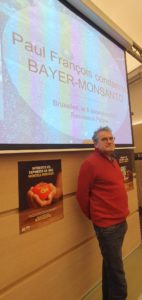The EU’s proposed 2040 climate target to reduce domestic emissions by 90% - while allowing up to 3% to be met through international carbon credits – risks undermining health protections. The Health and Environment Alliance calls on member states to strengthen their climate commitments in order to protect health, rather than delay and weaken overdue action.
Today, French farmer Paul François is in Brussels following the release of another national court ruling, as part of his decade-long legal battle against agribusiness giant Bayer-Monsanto. In addition to offering a deep-dive into the implications of this latest ruling, he seeks to share the lessons learnt from years of proceedings in the hope that his story can help other farmers falling victims to pesticide poisoning today and in the future [1].
This latest court ruling, issued in November 2022, underlines what other courts have consistently confirmed: Bayer-Monsanto is responsible for Paul François’s poisoning and the subsequent health consequences that he has suffered. However, the damage ordered from the company (at the level of 11,000 EUR) is minimal when compared to the hardships endured as well as the length and difficulty of the legal proceedings. The verdict does not send a strong signal to agrifirm companies selling harmful products, nor encourages other victims to fight for their cases [2].
HEAL stands in solidarity with Paul François in his struggle, which illustrates a global movement of victims of pesticide poisoning seeking legal recognition and compensation [3].
“HEAL continues to stand in solidarity with all the victims of exposure to harmful pesticides in their fight for justice and compensation. European and national decision-makers must stop turning a blind eye on the real-life consequences of people’s exposure to those substances, as illustrated by the cases of farmers’ poisoning, and urgently use their energy to deliver Europe’s promises to drastically cut the production and use of those substances at home and abroad”, comments Natacha Cingotti, Health and Chemicals Programme Lead at HEAL.
Paul François was poisoned after inhaling vapors of the herbicide product Lasso (which contains the active substance Alachlor) in 2004 while working. For over a decade, the farmer has been seeking recognition for his sufferings, which have included falling into comas, fainting, signs of neurological disorders and hospitalisation for months at a time.
He first filed a legal complaint against the firm and demanded compensation in 2007. The ruling released in November adds on the farmer’s long quest for justice and recognition. Initially found guilty of intoxicating Paul François in 2012 and again on appeal in 2015, Monsanto (now Bayer-Monsanto) was again confirmed to be legally responsible for François’s hardships by the Lyon Court of Appeal in 2019 [4].
While Alachlor was banned in the European Union in 2007 [5], it is still produced in Belgium for export purposes outside European borders. This illustrates a wider problem: in 2018 alone, more than 81,000 tonnes of pesticides containing 41 different hazardous chemicals banned for agricultural use in the EU were exported by European corporations outside of EU borders. Last week, over 325 civil society organisations came together to call for an immediate ban on this toxic export [6].
To support Paul François, please consider donating to his crowdfunding campaign.



